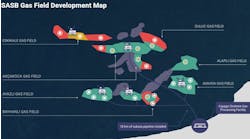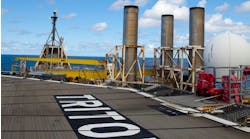Offshore staff
WASHINGTON, D.C. – The US House Subcommittee on Energy and Mineral Resources held a legislative hearing on HR 5577, introduced by Rep. Garret Graves (R-LA), the “Innovation in Offshore Leasing Act.”
HR 5577, a bipartisan bill co-sponsored by Rep. Alan Lowenthal (D-CA), amends the Outer Continental Shelf Lands Act to provide the Secretary of the Interior with the authority and direction to conduct internet-based oil and natural gas lease sales, thereby “modernizing” the US Bureau of Ocean Energy Management’s (BOEM) offshore leasing process.
Currently, the Secretary of the Interior conducts sealed-bid lease sales for oil and natural gas leasing, in which bids are opened and read aloud in the Superdome in New Orleans. Incorporating internet-based technologies are a cost-effective improvement that will bring greater efficiency and transparency to the Department of the Interior’s (DoI) offshore leasing process.
“Dealing with the government is like going back in time, and workflows the private sector retired decades ago are still alive and well. In the real world, work gets done online – that’s why I introduced this bill,” Rep. Graves stated. “Internet-based oil and gas leasing will open investment opportunities and competition for additional businesses, improve the transparency and efficiency of the process. Giving more companies a chance to work in the offshore will also increase energy revenue sharing to support the resiliency of Louisiana’s coastal ecosystems and communities on which our nation’s economy relies.”
William Britain, co-founder and chairman of EnergyNet, explained the benefits of interactive online lease sales. EnergyNet, an internet platform for oil and gas lease sales, conducts sales for the Bureau of Land Management, the Federal Deposit Insurance Corp. and numerous states including Texas, Colorado, Utah, and Wyoming.
“[T]he Oil and Gas Industry and State Lease Agencies have migrated their property sales to the internet in increasing numbers in order to reach more bidders, thus increasing competition, and in the process, enhancing transparency and security,” Britain said.
Jon Hrobsky, policy director for Brownstein Hyatt Farber Schreck, talked about his experience onouter continental shelf (OCS) issues at the DOI and in the private sector noting that BOEM already conducts wind energy lease sales online.
“Even the Department of Motor Vehicles has moved many of its functions to the internet. While the process to move oil and gas lease sales online will not be overnight, it is an endeavor the Bureau can and should do,” Hrobsky said.
BOEM Deputy Director Walter Cruickshank was said via statement to have given the agency’s stamp of approval on the “overall intent” of the bill.
Of the 1.7 billion offshore acres, only 1.3% or 22 million are currently under lease. The Obama Administration’sFive-Year Plan, currently being finalized, has fallen under fire, partly for being seen by some as restrictive. The US Atlantic margin was not present in the proposed plan despite being included in a previous draft, itself the subject of a hearing last month.
“Under current Federal policies, about 87% of the US offshore is barred from exploration, including the entire Atlantic. No other country along the Atlantic basin with an offshore oil and gas leasing program has closed so much of its energy potential,” National Ocean Industries Association (NOIA) President Randall Luthi said while testifying at the hearing.
“In fact, we don’t even know what the energy potential is, because we have not looked for over a generation,” Luthi said, referring to statements released by theInternational Association of Geophysical Contractors (IAGC) and others that seismic data of the area was more than 30 years old.
“While I recognize that is not the subject of today’s hearing, it is important to understand the context in which our nation exists with regard to our domestic offshore resources,” Luthi continued.
In addition, he said that while the offshore leasing program has worked “tremendously well, it does not mean that it cannot be improved by employing new technology.”
He related an incident that occurred earlier this year that could have turned dangerous: “Unfortunately, the open, public and transparent process has also provided an opportunity for abuse, which we witnessed at the last Gulf of Mexico Central sale in March in New Orleans.
“I recognize that hindsight is 20/20, but it appears to me that due to inadequate planning or poor communication, the lease sale that was held in March teetered on the verge of being a circus. As agency officials began to read the results of the bidding process, protesters situated near the podium began chanting loudly and attempted to bring the meeting to a halt.
“Before going any further, I want to commend the Department of the Interior and the Bureau of Ocean Energy Management for continuing to read the bids despite the disruption. However, that scene should never be repeated, and civil servants should not be placed in that situation again.
“NOIA applauds Congressman Graves and Ranking Member Lowenthal for their bipartisan sponsorship of the Innovation in Offshore Leasing Act and thanks the Energy and Mineral Resources Subcommittee for holding today’s hearing.
“Offshore energy development is a vital part of the US economy, providing jobs, energy security and much-needed government revenue. With that in mind, it is imperative that offshore lease sales remain a reliable, safe and transparent process. NOIA members will welcome an innovative lease sale process that reduces costs, guarantees that their bids remain confidential until publically released and ensures that bids are recorded correctly. The Innovation in Offshore Leasing Act is common sense legislation that will help bring the offshore lease sale process into the 21st Century.
“The Bureau of Land Management will be conducting its first internet-based onshore lease sale this fall, and the Bureau of Ocean Energy Management already holds online offshore wind lease auctions. There’s no reason why offshore oil and gas lease sales should be left behind. NOIA looks forward to working with the subcommittee and the rest of Congress in seeing this bill passed.”
07/06/2016


